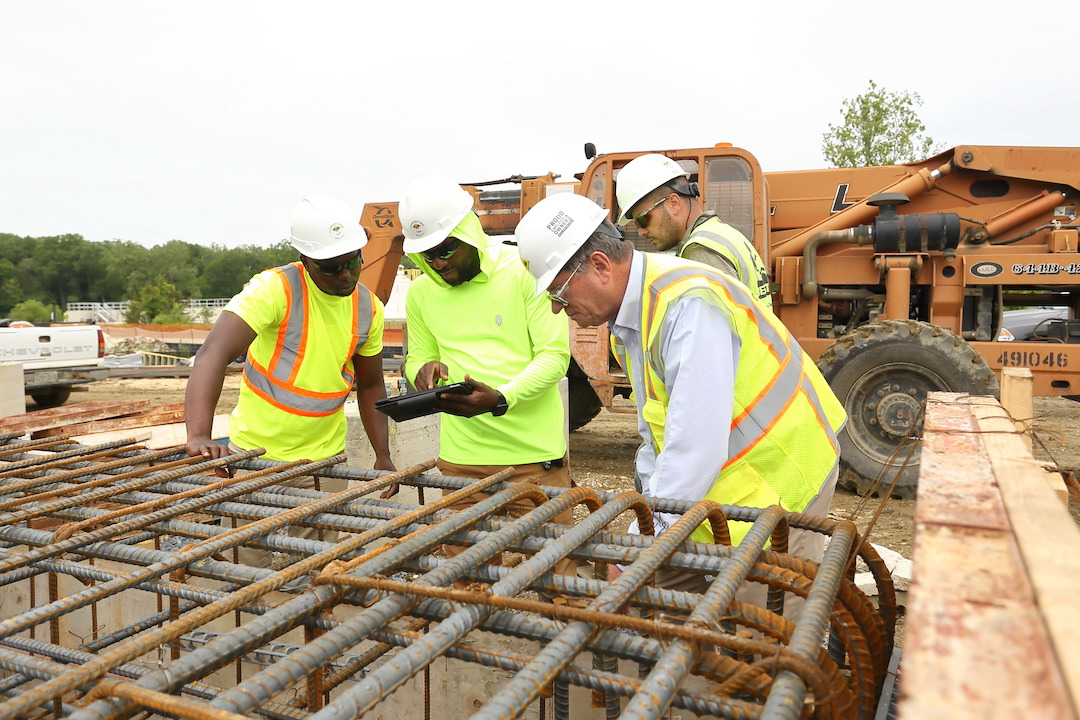Only 14 states and the District of Columbia have added construction jobs since just before the start of the pandemic in February 2020, according to a new analysis of federal employment data released today by the Associated General Contractors of America. Association officials noted that widespread supply chain disruptions amid and the lack of a much-needed federal infrastructure bill have impeded the sector’s recovery.
“Construction employment remains below pre-pandemic levels in more than two-thirds of the states,” said Ken Simonson, the association’s chief economist. “Supply problems have slowed down many projects and forced contractors to hold down employment, while the lack of an infrastructure bill is leading some to delay hiring.”
From February 2020—the month before the pandemic caused project shutdowns and cancellations—to last month, construction employment increased in only 14 states and D.C., decreased in 35 states, and stalled in Connecticut. Texas shed the most construction jobs over the period (-48,000 jobs or -6.1%), followed by New York (-47,300 jobs, -11.6%) and California (-32,600 jobs, -3.6%). The largest percentage losses were in Louisiana (-16.1%, -22,000 jobs), Wyoming (-15.7%, -3,600 jobs) and New York.
Utah added the most construction jobs since February 2020 (9,400 jobs, 8.2%), followed by Washington (6,300 jobs, 2.8%), North Carolina (5,300 jobs, 2.2%), and Idaho (5,100 jobs, 9.3%). The largest percentage gains were in Idaho, Utah, and South Dakota (7.9%, 1,900 jobs).
From August to September construction employment decreased in 16 states, increased in 32 states and D.C., and was unchanged in Iowa and Kansas. The largest decline over the month occurred in Tennessee, which lost 2,800 construction jobs or 2.1%, followed by Missouri (-1,600 jobs, -1.3%). The largest percentage decline was in Alaska (-800 jobs, -4.9%), followed by Tennessee and Montana (-400 jobs, -1.4%).
Texas added the most construction jobs between August and September (8,900 jobs, 1.2%), followed by Florida (6,900 jobs, 1.2%) and Washington (3,600 jobs, 1.6%). Connecticut had the largest percentage gain (3.0%, 1,700 jobs), followed by Delaware (2.9%, 700 jobs) and West Virginia (2.3%, 700 jobs).
Association officials continued to urge the Biden administration to remove tariffs on a host of key construction materials, including steel and aluminum, and to do more to relieve shipping bottlenecks that are crippling many parts of the distribution network. They also urged House officials to quickly pass a Senate-backed infrastructure bill to increase investments in the nation’s transportation and water systems.
“The latest state employment figures show that gridlock in our ports and on Capitol Hill is retarding construction employment as well as the broader economy,” said Stephen E. Sandherr, the association’s chief executive officer. “Even as the administration looks for ways to unclog domestic supply chains, the President should urge the House to pass the infrastructure bill, on its own, as quickly as possible.”
View state February 2020-September 2021 data and rankings, 1-month rankings.
Related Stories
Industry Research | Jun 26, 2017
Time to earn an architecture license continues to drop
This trend is driven by candidates completing the experience and examination programs concurrently and more quickly.
Industry Research | Jun 22, 2017
ABC's Construction Backlog Indicator rebounds in 2017
The first quarter showed gains in all categories.
Market Data | Jun 21, 2017
Design billings maintain solid footing, strong momentum reflected in project inquiries/design contracts
Balanced growth results in billings gains in all sectors.
Market Data | Jun 16, 2017
Residential construction was strong, but not enough, in 2016
The Joint Center for Housing Studies’ latest report expects minorities and millennials to account for the lion’s share of household formations through 2035.
Industry Research | Jun 15, 2017
Commercial Construction Index indicates high revenue and employment expectations for 2017
USG Corporation (USG) and U.S. Chamber of Commerce release survey results gauging confidence among industry leaders.
Market Data | Jun 2, 2017
Nonresidential construction spending falls in 13 of 16 segments in April
Nonresidential construction spending fell 1.7% in April 2017, totaling $696.3 billion on a seasonally adjusted, annualized basis, according to analysis of U.S. Census Bureau data released today by Associated Builders and Contractors.
Industry Research | May 25, 2017
Project labor agreement mandates inflate cost of construction 13%
Ohio schools built under government-mandated project labor agreements (PLAs) cost 13.12 percent more than schools that were bid and constructed through fair and open competition.
Market Data | May 24, 2017
Design billings increasing entering height of construction season
All regions report positive business conditions.
Market Data | May 24, 2017
The top franchise companies in the construction pipeline
3 franchise companies comprise 65% of all rooms in the Total Pipeline.
Industry Research | May 24, 2017
These buildings paid the highest property taxes in 2016
Office buildings dominate the list, but a residential community climbed as high as number two on the list.

















